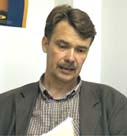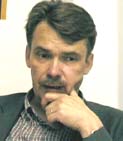Professor Harri Melin:
ISSP is a remarkable resource for comparative social research
Jaakko Koivumäki 14.6.2001
The annual conference of ISSP (International Social Survey Programme) was held in June 1-6, 2001 in Umeå, Sweden. This year, Finland participated for the first time. Finnish representatives were professor Raimo Blom and professor Harri Melin (Department of Sociology and Social Psychology at the University of Tampere) and professor Risto Sänkiaho (Chairman of the Board of the FSD).
The Umeå conference focused on research topics
In Umeå, research topics of coming years were discussed. Main themes of the conference were the realisation of the questionnaire of next year's module and deciding the content of modules of following years. It had been agreed earlier that the module of the year 2003 will deal with "national identity".
 - The contents of the module for the year 2004 was put to vote, and the result was that the theme for 2004 will be "citizenship", says Harri Melin who participated in the conference.
This year's theme, "social networks", was not discussed much. At the conference, representatives of the various countries were merely asked to estimate when the materials will be compiled and delivered to the ZA (Zentralarchiv für Empirische Sozialforschung) to be archived there. - The contents of the module for the year 2004 was put to vote, and the result was that the theme for 2004 will be "citizenship", says Harri Melin who participated in the conference.
This year's theme, "social networks", was not discussed much. At the conference, representatives of the various countries were merely asked to estimate when the materials will be compiled and delivered to the ZA (Zentralarchiv für Empirische Sozialforschung) to be archived there.
The ISSP has many member countries and it is not always easy to reach mutual understanding.
- The decision-making procedures of the ISSP can be characterised as democratic, says Melin. - In the beginning, the aim is at consensus through discussions and if unanimity is not reached, things are put to vote where each country has one vote. This year, Finland didn't have a vote yet because our country participated for the first time and had not delivered any material to the ISSP. Next year, the situation will be different of course.
According to Melin, there was perhaps even a bit excessive attention paid to the detailed planning of the next year's module. - Considerable amount of time was spent in choosing words and phrases used. The practice of the ISSP is that a proposed questionnaire is prepared in a so-called drafting group usually consisting of six democratically elected countries.
Former socialist countries and developing countries among the participants
- The ISSP data is a tremendous resource, enthuses Melin. - Most of all, it enables comparative studies.
 Together with Raimo Blom, Melin has studied former socialist countries and because of that, he finds the ISSP interesting. Together with Raimo Blom, Melin has studied former socialist countries and because of that, he finds the ISSP interesting.
- Eight post-socialist countries participate in the programme and of those, especially Russia is of interest to us because in Russia, materials have been collected since 1989. With our studies in mind, it was valuable that we were able to make contact with the representative of Russia at the conference.
Melin says that another highly interesting thing in view of research, is the presence of certain developing countries like the Philippines, Bangladesh, Venezuela and Mexico in the ISSP. He doubts the reliability of the samples, however, because the literacy rate of these countries is relatively low.
- In any case, the ISSP provides totally new opportunities for studies on developing countries, says Melin in conclusion.
Top of page | Privacy Policy
|